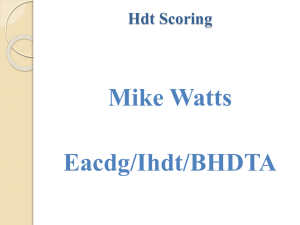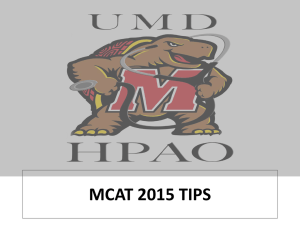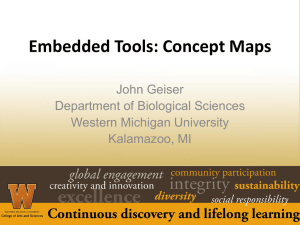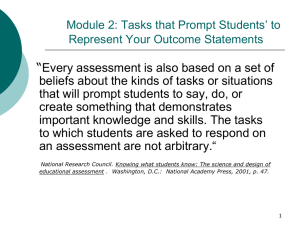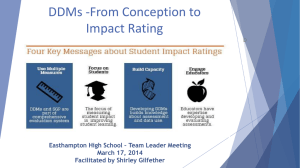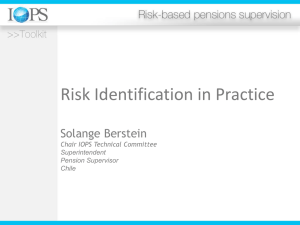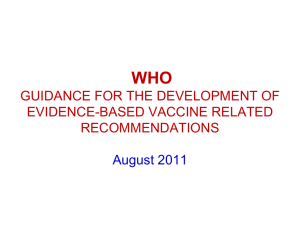2 - Tobacco Control Evaluation Center
advertisement
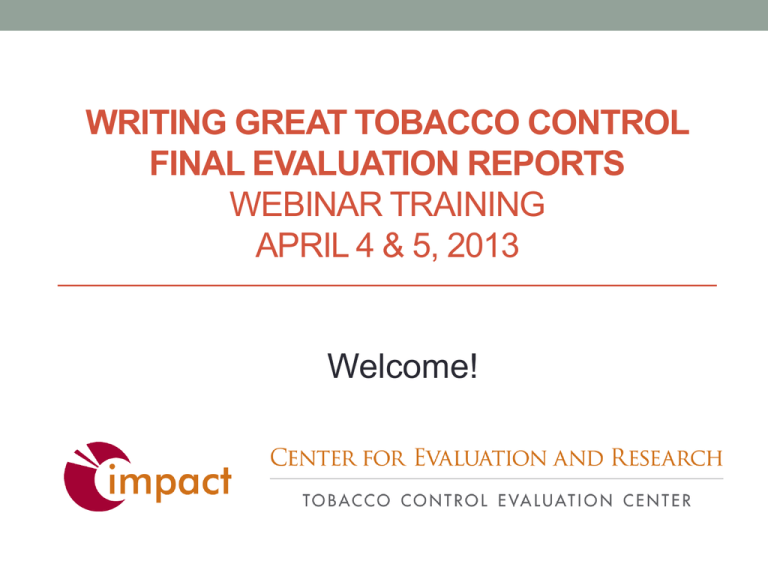
WRITING GREAT TOBACCO CONTROL FINAL EVALUATION REPORTS WEBINAR TRAINING APRIL 4 & 5, 2013 Welcome! 2 AGENDA Thursday, April 4th 10:00-10:10 Welcome! 10:10-10:45 The Project Description Section:: Overview, scoring the report, discussion 10:45-11:30 The Methods Section Overview, scoring the report, discussion Friday, April 5th 10:00-10:45 Writing Up Results & Conclusions, Overview 10:45-11:30 Scoring and Discussion 3 WHY FINAL REPORTING? Organizational History Sharing with colleagues idi.org 4 STATEWIDE & NATIONAL RELEVANCE TCEC publishes summary reports and articles 5 Reporting Guidelines 6 FER RATING FORM Report Section (maximum 32 points) Maximum Points Title Page 2 Abstract 6 Project Description 6 Evaluation Methods 8 Evaluation Results 4 Conclusion & Recommendations 6 PROVIDING SOME CONTEXT: PROJECT DESCRIPTION SECTION 8 PROJECT DESCRIPTION SCORING (maximum 6 points) Project Description Background Objective Intervention Maximum Points 2 2 2 9 PROJECT DESCRIPTION ELEMENTS Provide context for the objective Explain rationale for choosing the objective State the objective and indicator Describe what you did and why Identify activity timeframes Explain any changes to plan 10 IT’S YOUR TURN TO SCORE 10-15 minutes • Read and score the project description of this report • Write on the report any questions you have 5-10 minutes • Discuss scores as a group. EVALUATION METHODS 12 DESIGN TYPE PROCESS AND OUTCOME Experimental (control group, random assignment) Quasi-experimental (at least three waves, comparison group) Non-experimental (no comparison, only two waves) Process and/or Outcome 13 DESIGN LIMITATIONS 14 SAMPLES 15 DATA COLLECTION INSTRUMENTS AND PROCEDURES 16 DATA ANALYSIS 17 EVALUATION METHODS SCORING (MAXIMUM 8 POINTS) Evaluation Methods Evaluation design 2 Samples from which data were collected 2 Data collection instruments and procedures 2 Data analysis 2 18 IT’S YOUR TURN TO SCORE 10-15 minutes • Read and score the Evaluation Methods section in pairs • Write on the report any questions you have 5-10 minutes • Discuss scores as a group. 19 SCORING METHODS SECTION 20 REMEMBER TO JOIN US TOMORROW! PART 2 begins at 10:00 a.m. Same login info: 1. Call in for audio at 1.866.740.1260 and enter access code 2974659, AND 2. Log in for the visuals at www.readytalk.com and enter the access code 2974659 21 Our team — Diana Cassady, Jeanette Treiber, Robin Kipke, Catherine Dizon, Diana Dmitrevsky Our website — http://tobaccoeval.ucdavis.edu Our email — tobaccoeval@ucdavis.edu Our main line — 530.752.9951 We are the statewide technical assistance center on evaluation for all Prop. 99-funded projects in California WRITING GREAT TOBACCO CONTROL FINAL EVALUATION REPORTS WEBINAR TRAINING APRIL 4 & 5, 2013 Part 2 Welcome! 23 AGENDA Thursday, April 4th 10:00-10:10 Welcome! 10:10-10:45 The Project Description Section Overview, scoring the report, discussion 10:45-11:30 The Methods Section Overview, scoring the report, discussion Friday, April 5th 10:00-10:45 Writing Up Results & Conclusions, Overview 10:45-11:30 Scoring and Discussion WRITING UP RESULTS 25 BRAINSTORM What is the purpose of the results section of a report? What function(s) should it serve? 26 PURPOSE OF THE RESULTS SECTION Present the findings of data analysis Explain what the data reveal Point out what is important Describe how the data informed your project Justify report conclusions 27 FER SCORING CRITERIA Evaluation Results Maximum Points Findings are clearly & logically presented. Tables and figures are used when needed and are clearly labeled. Findings are objective (include both positive and negative when relevant) Section total 2 2 4 28 WHAT TO INCLUDE Report on every activity But don’t report every result 29 QUANTITATIVE DATA 202 (79%) Alta Vista residents were in favor of the policy Provide totals and percentages Note statistical significance (where appropriate) 30 EXCEL-GENERATED TABLE A paired T-test comparing 2010 and 2013 shows a statistically significant difference in the number of cigarette butts between 2010 and 2013 (p<0.05) 31 VISUALLY IMPROVED TABLE Table 1. Number of Cigarette Butts in Sacramento Area Parks, by Year Location 2010 2011 2012 2013 Arden 68 72 81 37 Sunrise 282 343 314 45 Fair Oaks 121 180 196 58 McKinley 312 369 231 111 Goethe 216 248 239 222 *999 1212 1061 *473 Total Citywide *Statistically significant difference p<0.05 32 LINE GRAPH 33 BAR CHART 34 QUALITATIVE DATA Common themes Contrasts Indicative quotes Avoid percentages 35 SUMMARIZING CONTENT ANALYSIS Figure 3. Incentives and Barriers to Smoke Free Casino Policy 36 BALANCING ACT Focus on what’s most important Report both + and - results Make results transparent 37 ATTENTION GETTERS Supplement text with visual elements Draw focus to key findings Make data digestible Match format to data type CONCLUSIONS & RECOMMENDATIONS 39 FER SCORING CRITERIA Conclusions & Recommendations Maximum Points Discuss outcome/process evaluation 2 Conclusions are supported by data 2 Includes recommendations for future work 2 Section total 6 40 INTERPRETING THE FINDINGS Confirm what you expected to find, and did Dispel what you thought was true, but isn’t Bring to light what you didn’t know, but should 41 LEAVING A ROADMAP What strategies worked well or poorly? What would you do differently next time? What steps should follow? 42 IT’S YOUR TURN TO SCORE 10-15 minutes: •Read and score the results and conclusions/ recommendations section •Note any questions you have 10-15 minutes: •Reconvene to share scores 43 AS YOU REVIEW THE RESULTS… 1. What questions does it leave unanswered? 2. Do the results address what the project wanted to know? 3. Did the section provide enough information for the reader to assess the findings? 4. Are the most important findings brought out in the narrative and/or the tables? 5. Do the findings appear to be objective? 6. Does the section adequately interpret the results by explaining how the data informed the project? 44 AS YOU REVIEW CONCLUSIONS 1. Do the conclusions evaluate the process and outcome findings in relation to the achievement of the objective? 2. Are the conclusions supported by the data? 3. Do the recommendations provide a clear roadmap for next time? 45 REPORT RATING Total score: ___/32 possible points Rating: ____ High (24-32) ____ Medium (16-23) ____ Low (0-15) Overall Assessment: Recommend report for intervention activities? Recommend report for evaluation? 46 WORKSHOP RECAP Why final evaluation reports matter Essential components of a report Provide enough detail about your path Make rationale and linkages transparent How reports are scored Use ratings & feedback to improve 47 PARTICIPANT SELF-ASSESSMENT Help us learn how we’re doing. Complete the self-assessment form and rate your understanding of writing final evaluation reports before and after this training. Thank you! 48 Our team — Diana Cassady, Jeanette Treiber, Robin Kipke, Catherine Dizon, Diana Dmitrevsky Our website — http://tobaccoeval.ucdavis.edu Our email — tobaccoeval@ucdavis.edu Our main line — 530.752.9951 We are the statewide technical assistance center on evaluation for all Prop. 99-funded projects in California

